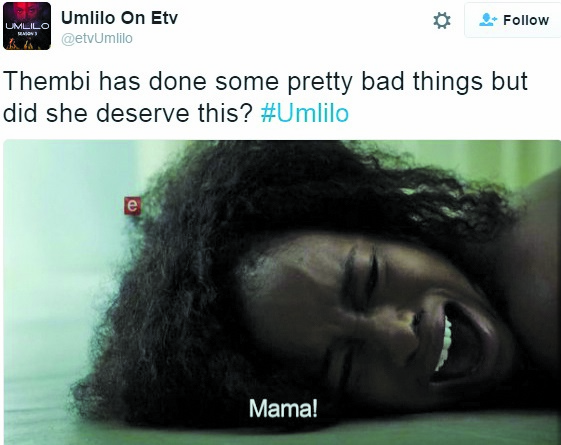
I have cancelled my Netflix subscription. That is how, on Tuesday night, I found myself watching e.tv’s Umlilo, a local show that follows the turbulent and dramatic lives of the polygamous Simelanes.
Within minutes of settling down and trying to make sense of the story, I found myself witness to a horrific rape scene: Thembi is trapped in a mental health institution, and a nurse drags her into a room while she shrieks and struggles, saying things like, “You did this to yourself” and “You asked for this”.
I recall murmuring the admonition “trigger warning” to myself as I tried to keep from throwing up, bursting into tears and fleeing into another part of the flat.
The story arc ends with a naked Thembi lying on the floor in a room, restrained and crying for her mother. It is an image I will not forget.
The next morning, a tweet from the Umlilo Twitter account said: “Thembi has done some pretty bad things, but did she deserve this?” It accompanied a screenshot of Thembi on the floor, crying, the word ‘Mama!’ appearing in stark white along the bottom. The tweet has since been deleted.
Deciding to portray rape within a fictional narrative is a sensitive and contentious topic. It so regularly becomes a perverse tool for plot progression, a traumatic event stuck into the story simply for the entertainment purposes.
Often, it is graphic and licentious in the extreme, serving no primary function, except to stir up horror and shock.
Dangerously – and incorrectly – rape is used as a catalyst for extreme character development: either to direct the character towards revenge (as is the case in the infamous 1978 cult movie I Spit on Your Grave) or towards a “badass” sense of betterment (suggested, unfortunately, in the rebooted Tomb Raider game).
These are the ways that rape is used to drive up ratings. It is carelessly and unsympathetically cast into a story line just to make the audience recoil. But so much about this horrific situation is left out.
The media favours a “stranger danger”, “forewarned is forearmed” approach to rape – when, in fact, rapists are more likely to be known to the survivor. Rape portrayals tend to be wantonly violent, typecasting sexual assault – as if rape does not take other abhorrent forms.
There is also the inference that rape is exceptional, the people harmed unique and the circumstances around it extraordinary.
In South Africa, where rape is the daily norm, there is nothing extraordinary about this scourge. This points to the senseless way that rape is portrayed on drama shows, which seldom explore the repercussions of sexual assault in their entirety.
As a result, stereotypes are reinforced. This only contributes to the rape crisis in our country, where survivors tend to be blamed and rapists absolved.
Yet we cannot simply stop portraying and acknowledging rape in our stories. To do so would be a massive disservice, a slap in the face, to those who have to deal with sexual assault in their lived reality
. As writers and storytellers, it is our job to reflect the lives and experiences of the people around us as honestly and empathetically as we can (fictional superheroine Jessica Jones is an excellent example of this).
To remove rape from fictional narrative is to in effect ignore it – to pretend that, for so many, it is not a fearful thought the moment they step out the front door, and often long before that. Rape portrayals by the media deserve more than just shock value – because sexual assault is more than just shock value.
Portraying rape as anything less than the physical, emotional and mental attack serves only to protect, and even justify, this scourge.
Buchanan is a writer




 Publications
Publications
 Partners
Partners








